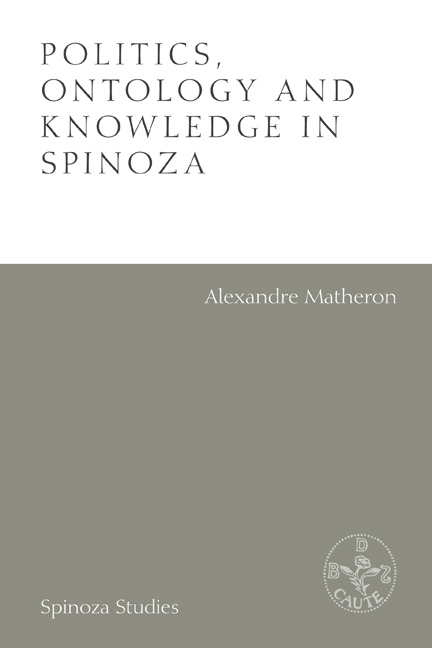Book contents
- Frontmatter
- Contents
- Abbreviations
- Notes on Translation and Acknowledgements
- A Revolutionary Beatitude: Alexandre Matheron’s Spinozism
- I Spinoza on Ontology and Knowledge
- 1 Idea, Idea of the Idea and Certainty in the Tractatus de Intellectus Emendatione and the Ethics
- 2 Essence, Existence and Power in Part I of the Ethics: The Foundations of Proposition 16
- 3 Physics and Ontology in Spinoza: The Enigmatic Response to Tschirnhaus
- 4 The Year 1663 and the Spinozist Identity of Being and Power: Hypothesis on a Development
- 5 Eternal Life and the Body According to Spinoza
- 6 Intellectual Love of God, Eternal Part of the amor erga Deum
- II Spinoza on Politics and Ethics
- 7 State and Morality According to Spinoza
- 8 Ethics and Politics in Spinoza (Remarks on the Role of Ethics IV, 37 Scholium 2)
- 9 Indignation and the Conatus of the Spinozist State
- 10 Passions and Institutions According to Spinoza
- 11 The Problem of Spinoza's Evolution: From the Theologico-Political Treatise to the Political Treatise
- 12 Is the State, According to Spinoza, an Individual in Spinoza’s Sense?
- 13 The Ontological Status of Scripture and the Spinozist Doctrine of Individuality
- 14 Spinoza and Power
- 15 Spinoza and Property
- 16 Spinoza and Sexuality
- 17 Women and Servants in Spinozist Democracy
- 18 The ‘Right of the Stronger’: Hobbes contra Spinoza
- 19 The Theoretical Function of Democracy in Spinoza and Hobbes
- 20 Spinoza and the Breakdown of Thomist Politics: Machiavellianism and Utopia
- Appendix 1 Interview with Laurent Bove and Pierre-François Moreau
- Appendix 2 Chronology of Works by Matheron
- Works Cited
- Index
5 - Eternal Life and the Body According to Spinoza
Published online by Cambridge University Press: 03 October 2020
- Frontmatter
- Contents
- Abbreviations
- Notes on Translation and Acknowledgements
- A Revolutionary Beatitude: Alexandre Matheron’s Spinozism
- I Spinoza on Ontology and Knowledge
- 1 Idea, Idea of the Idea and Certainty in the Tractatus de Intellectus Emendatione and the Ethics
- 2 Essence, Existence and Power in Part I of the Ethics: The Foundations of Proposition 16
- 3 Physics and Ontology in Spinoza: The Enigmatic Response to Tschirnhaus
- 4 The Year 1663 and the Spinozist Identity of Being and Power: Hypothesis on a Development
- 5 Eternal Life and the Body According to Spinoza
- 6 Intellectual Love of God, Eternal Part of the amor erga Deum
- II Spinoza on Politics and Ethics
- 7 State and Morality According to Spinoza
- 8 Ethics and Politics in Spinoza (Remarks on the Role of Ethics IV, 37 Scholium 2)
- 9 Indignation and the Conatus of the Spinozist State
- 10 Passions and Institutions According to Spinoza
- 11 The Problem of Spinoza's Evolution: From the Theologico-Political Treatise to the Political Treatise
- 12 Is the State, According to Spinoza, an Individual in Spinoza’s Sense?
- 13 The Ontological Status of Scripture and the Spinozist Doctrine of Individuality
- 14 Spinoza and Power
- 15 Spinoza and Property
- 16 Spinoza and Sexuality
- 17 Women and Servants in Spinozist Democracy
- 18 The ‘Right of the Stronger’: Hobbes contra Spinoza
- 19 The Theoretical Function of Democracy in Spinoza and Hobbes
- 20 Spinoza and the Breakdown of Thomist Politics: Machiavellianism and Utopia
- Appendix 1 Interview with Laurent Bove and Pierre-François Moreau
- Appendix 2 Chronology of Works by Matheron
- Works Cited
- Index
Summary
In this chapter I would simply like to present some remarks on the reasons that justify Proposition 39 of Part V of the Ethics: ‘He who has a Body capable of a great many things has a Mind whose greater part is eternal.’ In order to do this, given that the eternity of our mind has a relation to intellectual knowledge, we must first of all try to specify what exactly is the correlate of our adequate ideas: what happens in the body when the mind understands? After that, we will be better able to understand what Spinoza tells us about the relations between the body and eternal life.
What is the corporeal correlate of our adequate ideas? We know, of course, what corresponds to universal common notions and proper common notions: for the former, it is the properties that are common to all bodies and that are equally in the whole and in the parts of each; and, for the latter, the properties that are common to our bodies and to certain external bodies by which they are usually affected, and that are equally in the whole and in the parts of each of these external bodies. We also know what the correlate of the true idea of God is: it is God itself, considered under the attribute of Extension, which is present in each and every one of our body’s affections. But what is the correlate of the deductions that we undertake based on common notions or the idea of God? On this point, we can look to Proposition 10 of Part V, to which the demonstration of Proposition 39 refers: ‘So long as we are not torn by affects contrary to our nature, we have the power of ordering and connecting the affections of the Body according to the power of the intellect.’ And the demonstration explains: so long as we are not torn by affects contrary to our nature, our mind is not prevented from understanding; thus it understands, in this way organising its adequate ideas according to the order of deduction; and consequently, in our bodies, affections are organised in the same order.
- Type
- Chapter
- Information
- Politics, Ontology and Knowledge in Spinoza , pp. 68 - 80Publisher: Edinburgh University PressPrint publication year: 2020



